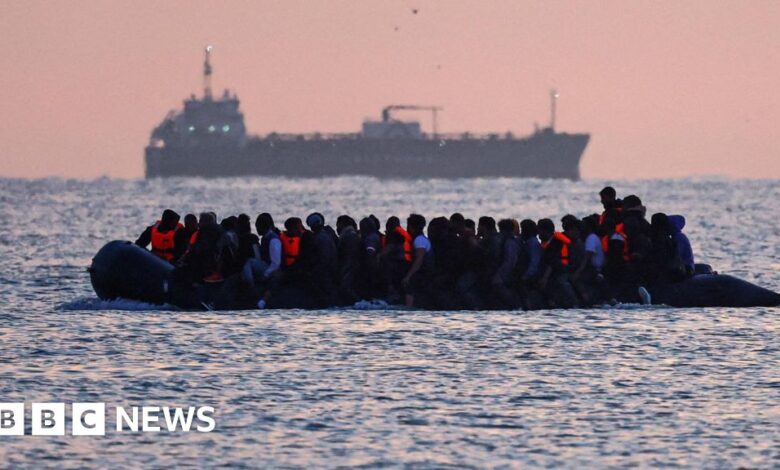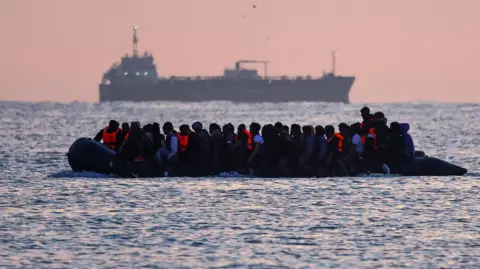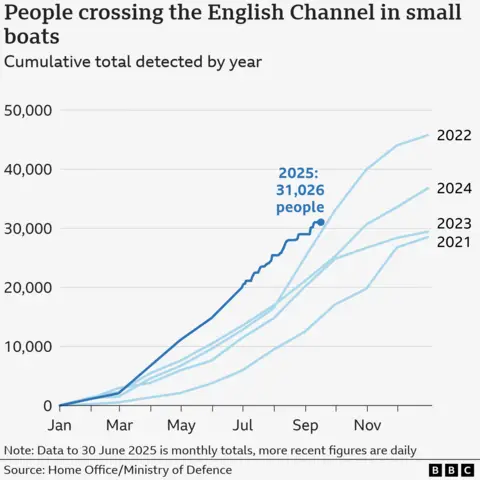First migrant deported to France under ‘one in one out’ deal

Dominic CascianiHome and Legal Correspondent and
Tom McArthur
 Reuters
ReutersThe first flight carrying a cross-channel small boat migrant has landed in Paris, under the UK-France agreement.
The man, an Indian national, was removed from the UK on Thursday morning on an Air France plane.
It comes a little over a month since the UK and France agreed a year-long “one in, one out” pilot scheme of exchanges of migrants in the hope of deterring small boat crossings.
Meanwhile, later on Thursday the High Court rejected an attempt to temporarily stop another migrant – an Eritrean man – being removed to France, paving the way for a flight to take off early on Friday morning.
The court in London heard the man, who was granted anonymity, was set to be deported from the UK at 06:15 BST on Friday.
In a ruling after a three-hour emergency hearing on Thursday evening, Mr Justice Sheldon said there was no legal justification to delay the transport of the man to France.
His lawyers had argued that he may have been the victim of trafficking and there had been assurances that the French would properly look after him.
The Eritrean man said he fled his home country in 2019 because of forced conscription – and he spent time in Ethiopia, South Sudan and Libya before coming to Europe, and eventually making his way to Dunkirk to try to cross to England – arriving on 6 August.
His subsequent asylum claim was refused – as was his account that he should be protected in the UK as a victim of trafficking or slavery after officials concluded he had changed his story and could not be believed.
It comes after the government said it would appeal against a High Court decision to temporarily block the deportation of a separate Eritrean man on modern slavery grounds.
Reacting to the first migrant being deported under the scheme, Home Secretary Shabana Mahmood said: “This is an important first step to securing our borders.”
“It sends a message to people crossing in small boats: if you enter the UK illegally, we will seek to remove you”, she added.
Later on Thursday, US President Donald Trump was asked at a joint news conference at Chequers what advice he would offer Sir Keir Starmer on border control.
“I told the prime minister I would stop it, and it doesn’t matter if you call out the military, it doesn’t matter what means you use,” Trump said.
In response, Sir Keir said: “This is an issue we are taking incredibly seriously, we have struck a number of cooperation deals with other countries because this is a problem right across Europe.
“We struck the returns arrangement with France and notwithstanding the challenges to that scheme that you’ve seen in the last few days, a flight went off at 06:15 this morning successfully returning someone in that scheme.”
While the Home Office says that more flights are planned in the coming days, it’s not clear how many passengers will be booked on to each one because of ongoing legal challenges – or threats of them.
Around 100 men are currently in immigration removal centres near Heathrow under the scheme. Each one was detained after arriving in the UK on a small boat and told they were potentially eligible to be returned to France.
Days later, officials told them that they would be given a departure date – but it’s not clear how many know what that is.
The BBC is aware of around 50 men who are being supported by refugee charities – but as of Thursday morning less than a fifth of them had a formal letter informing them of when they would be sent to France.
Around a similar proportion are said to be lobbying for a reconsideration because they argue they have been victims of slavery and trafficking, regardless of the strength of their claim to be a refugee.
Around 5,590 migrants have reached the UK since the scheme came into effect at the start of August.
Meanwhile a government appeal has been launched, aimed at limiting the time migrants have to provide evidence to challenge their removal.
Further deportation flights are planned this week and into next week, the Home Office said.
Initially, it was thought another person would be leaving on a flight on Thursday – but the BBC understand this is now not going to happen.
The Home Office also said the first arrivals from France through the new asylum route are expected in the UK in the coming days.
“The UK will always play its part in helping those genuinely fleeing persecution, but this must be done through safe, legal, and managed routes – not dangerous crossings,” it added.
Mahmood earlier vowed to fight “vexatious, last-minute claims” after the High Court intervened this week in the case of an Eritrean man who argued, after arrival in the UK by small boat last month, that he was a victim of modern slavery just hours before his flight was due to take off.
But the UK’s independent anti-slavery commissioner told BBC Radio 4’s Today programme she was “deeply concerned” about the home secretary’s words.
Eleanor Lyons said that suggesting the system was being abused created a “tool for traffickers to use with those victims that they are exploiting”.

The “one in one out” deal is intended to act as a deterrent against migrants attempting to make the treacherous English Channel crossing in small boats.
It proposes that, for each migrant the UK returns to France, another migrant with a strong case for asylum in the UK will come in return.
Under the treaty, the UK can immediately detain anyone who crosses the English Channel and, within around two weeks, agree with the French authorities to return the individual.
The aim of the plan is to make people think twice about turning to smugglers because of the risk that they will be sent back.
There is no suggestion from either government that the plan will, on its own, smash the cross-channel trade.





